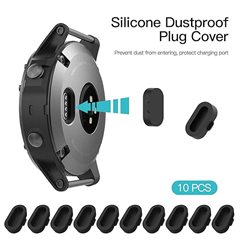NOTICE! Thoroughly rinse the device with fresh water after exposure to chlorine, salt water, sunscreen, cosmetics, alcohol, or other harsh chemicals. Prolonged exposure to these substances can damage the case.
Absolutely never ever take a Garmin watch near salt water, the 3rd charge pin will immediately rust - I've replaced 4 watches under warranty due to this and then didn't swim again with the 5th. when I accidentally forgot to remove it one time, a 30 minute swim was enough to ruin it
F3, F5, F6 & F7 used extensively in salt water including surfski paddling and scuba dives to 40m. Still have all oft them and all still working with no issues.
Do you want to swap? ;-) All mine went rusty within 10 mins of contact - Some people have no issues, but others find immediate rust (internet full of photos of rusty F5 charge pins) I suspect there are certain runs of the watches which had inadequate protection , so it just depends on your region. Unfortunately it seems the Italian market has the rust-prone ones.
All mine went rusty within 10 mins of contact
OK, I see you are Italian, so 10 minutes probably means 10 months, and your 5th exchanged device is probably in fact the second one, but still I think the rusting can be prevented by a good care about the watch - rinsing and drying immediately after the use in saltwater, and cleaning up and then with medical alcohol can do wonders. Using a hard pencil rubber for cleaning the contacts occasionally may help too.
I also recommend buying some plugs for the contacts. You find them on Amazon, on eBay, or on Aliexpress for a bargain. Although they are not designed to be waterproof, they do protect the contacts not only in the sea, but also from the sweat (which can be more aggressive than seawater), and from dust. Additionally, besides protecting the contacts, it protects your skin from bacterial rash (plenty of dirt and bacteria hides in the cavity of the contacts), and from allergic reactions to the metal of the contact. The electrical charge present on the contacts may also cause some reactions at sensitive persons.

Not sure why resorting to crude stereotypes is helpful (and I'm British by the way), it is exactly 5 watches, [the first replacement had a bad battery, the second i got a new receipt for, the third I replaced after a further 18 months, that went immediately rusty and the 4th and final replacement I got in the last week of the secodnd2 year warranty, hence the reason I can still use a rusting but functional F5) but why would I make that up? and I was in the water approximately 10 minutes (maybe 8, maybe 15, I wasn't counting) when I realized I still had the watch on, immediately got out the water, immediately rinsed it with fresh water, but it was already rusting. The watch still works, but that pin now rusts every time I run. I had actually seen those plug covers, but I was worried they would trap humidity in, and also, wouldn't effect the functioning of the watch? The reason the third pin only rusts, and not the others, is that is the one they send the current through to detect if it is being worn. If it is covered then that would not work, or?
why would I make that up
I have no idea, but you clearly exaggerate, so it is hard to believe your claims. Telling that contacts on all your watches corroded within 10 minutes (that's what you wrote), is simply not believable, and not even physically possible. If you clean the contacts and make a 10 minutes long video demonstrating how the contacts rust, then I will perhaps believe you.
In five years, I used several Garmin watches, am in the sea with them almost every day, often for several hours, and have zero problems with rust on contacts. Well, I do take care of the watch, rinse and dry it carefully after every sweaty activity, or after use in the sea, and I do use the contact plug protector (though did not have it initially at my first watch).
The reason the third pin only rusts, and not the others, is that is the one they send the current through to detect if it is being worn. If it is covered then that would not work, or?
I am not aware of any such functionality. My watches with the plug always detected without problems whether they are worn or not (the optical HR sensor is used for that purpose). Besides that, the pins are placed relatively deep in the connector pit, so there would be barely any reliable contact with the skin, unless worn really tightly.
unprotected steel can rust in ten minutes, try using a DIY store bolt on a sailing boat and you'll see, it's basic physics. Maybe you work for Garmin and have a vested interest, or maybe you can't post on forums without insulting the integrity of others just because their experience was different from yours, all I know is my 99euro fitbit lasted 4 years of daily sea swimming without an issue, and my 400+ euro Garmins all rusted after a single exposure to salt water each time.